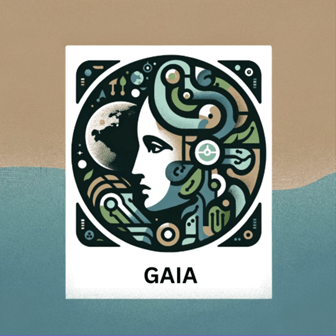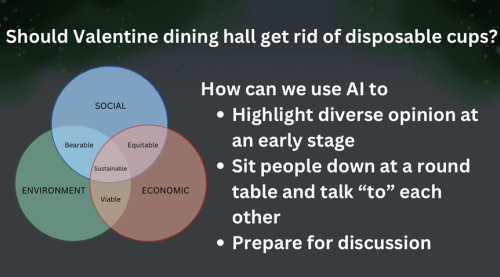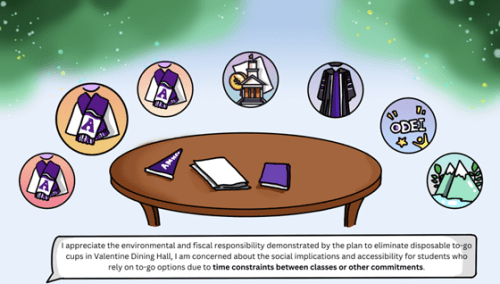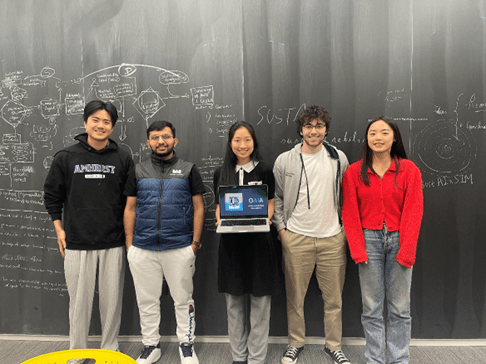Written by: Sebastien, Tina, Dhyey, Selena and Taichi
In December 2023, our team placed 1st at Amherst College’s inaugural Hack The Herd sustainability hackathon. Our project (Gaia) was born from a desire to improve discussions around campus sustainability projects and improve communication between the various stakeholders involved in such decisions. We initially spoke with Wes Dripps, the director of sustainability at Amherst College, about potential projects that might be particularly applicable to Amherst, and noticed that many involved an element of communications improvement. In short, it was difficult to implement certain policies due to the complex interplay between different school actors: some policies had unforeseen consequences when implemented that caused them to be rolled back, and questions of cost and student feedback could be difficult to reconcile.

Our Propose Solution
We wanted to create a tool to facilitate discussion and communication, as we reasoned that such an approach would streamline the adoption of new sustainability projects and decrease friction in the decision-making process. In practice, it is often difficult to coordinate meetings and discussions between the various departments and decision-makers that ultimately approve new sustainability measures. Several of our members had previously worked on MinervAI, a generative AI based tool for simulating interactions between students and educators to better prepare them for teaching students of various backgrounds.

Building on this idea, we realized that simulating the interactions between various stakeholders participating in discussions around sustainability (students, professors, environmental activists, budgetary offices,etc…) could help each group better understand the unique hurdles and obstacles faced by their peers. Thus, each group could proactively account for the needs and demands of the others, creating a more inclusive and complete decision-making process. We also wanted the tool to encompass a broad spectrum of shareholders, as socioeconomic, educational and political backgrounds very just some factors that might influence individual opinions.
How Gaia works?
Our tool takes as an input either pdf or Excel files containing information on a planned project to promote sustainability at Amherst. The data from said files is fed into several generative AI agents, each of which is initialized with a unique personal background which informs their viewpoints (such as “Office of Financial Planning” or “Middle Class Student/Liberal/English and Political Science Major”). Thus, each agent generates a unique perspective on the project, and we also share information on other agents’ decisions between them to simulate a roundtable style discussion.

This process encourages the agents to produce more nuanced responses by considering the concerns of their peers. Each agent’s response is played using an audio output for increased accessibility, and a concise summary of all discussions is then produced by another agent. Finally, the user may provide a spoken-word response detailing their plans for the project and whether or not it should be implemented. Each agent analyzes this decision and provides their feedback, which is then analyzed to determine sentiment polarity and assess stakeholder feedback.
We learned a lot of new coding techniques and best practices by participating in this event, and were also able to see just how essential students are in shaping the sustainability policies of the college through their action and feedback! We would like to thank AILA and the Office of Sustainability for organizing this wonderful event.
Sebastien, Tina, Dhyey, Selena and Taichi
